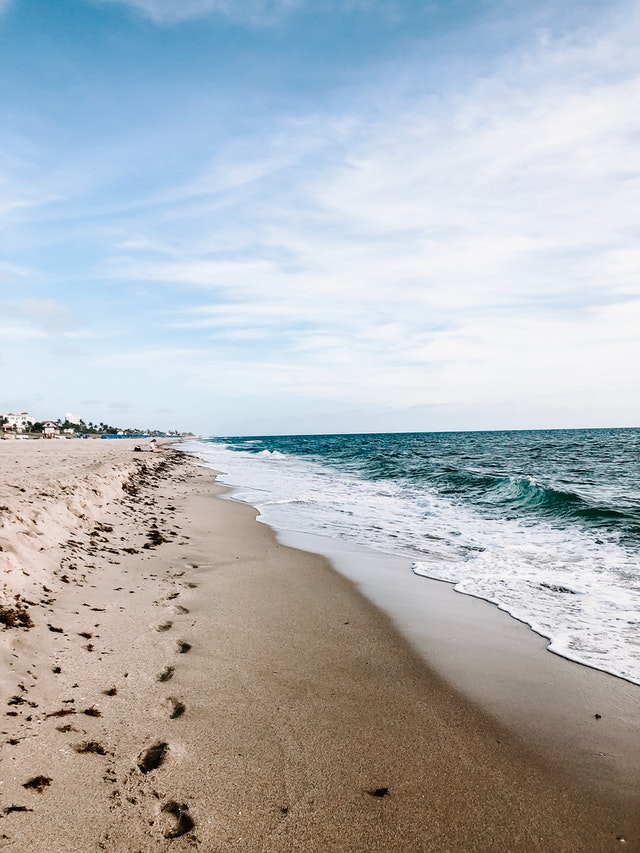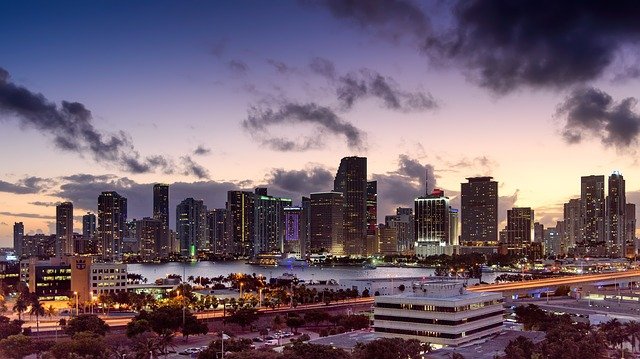Pros and Cons of Living in Florida
Florida, the Sunshine state, draws people from all over the world. People who live for sunny days at the beach may wish to pack their belongings and go to Florida, but there’s more to this state than its scenery.
In Florida, you’ll find thrilling theme parks, a booming employment market, and everything from suburbs to the countryside. Even with these advantages, keep in mind that moving to Florida is not for everyone.
Are you considering moving to Florida? You’re not the only one who feels this way. Every year, hundreds of visitors flock to the Sunshine State’s sandy shores, and it’s easy to see why. There are many reasons to adore living in Florida, from the lack of state income tax to the warm weather.
It is also an interesting city to live in because of its diverse population, delicious food, and many activities. In this article, we have tips to aid your decision of relocating to Florida and the pros and cons.

Moving to Florida — Everything You Need to Know
So you’re thinking of relocating to Florida. The state provides something for everyone, from beaches to art districts to stadiums. It’s no surprise that Florida is currently the third most populous state in the United States.
You’ll need to conduct some study whether you’re drawn to the low cost of living in Florida or the nicer weather. Fortunately for you, we took care of a lot of the legwork in this article.
You’re about to realize everything there is to know about the Sunshine State, from local school resources to every other information available.
Table of content [hide]
Reasons to Move to Florida
- Weather: Maybe you have asked, “why are people moving to Florida?” Certainly, it’s because of the weather! With almost 200 days of sunshine every year, Florida welcomes newcomers with extraordinarily warm and bright weather. Florida seasons are typically temperate and warm, despite the hot summers.
Those who live in the southern part of Florida will probably never require more than a sweater in the winter. Residents can spend less time indoors and more time outdoors discovering all that Florida offers because there are so many warm and sunny days each year. - Income tax: Looking to increase your monthly savings? Consider making the move to Florida. Most states in the United States compel people to pay state income taxes, but Florida does not.
Fortunately for Floridians, the absence of a state income tax allows them to save more of their hard-earned money for fun activities, vacations, and personal possessions. - Beaches: Right outside their doors, residents have access to some of the world’s best and most picturesque beaches. Sarasota’s Siesta Public Beach, which was named the number one beach in the United States by TripAdvisor, Clearwater Beach, Pensacola Beach, Delray Beach, St. Joseph Peninsula State Park, Panama City Public Beach, Grayton Beach, and St. George Island are just a few of Florida’s well-known and award-winning beaches.

- Diverse cultural landscape: No other state compares to Florida on cultural diversity. People of every age, religion, and background may be found throughout the state, making it one of the country’s greatest melting pots.
Many people are snowbirds and transplants from other states who have migrated to Florida for the weather, career opportunities, and tax benefits, in addition to those who were born and bred in the state.
Florida has a big Latino population due to its coastal location. One reason why Florida is such a fascinating place to live is because of its diversity. - Enticing food and drinks: Florida has a wide range of delightful culinary options, from its famous stone crabs to its locally brewed specialty beers.
It’s a destination for fresh fruit, with its diverse climate zones and booming farms producing world-famous oranges, sugarcane, tomatoes, watermelon, avocados, strawberries, and more.
Empanadas, Cuban coffee, sweet plantains, and other Cuban delights are popular because of the state’s considerable Cuban influence. Restaurants in Florida feature a variety of island-inspired and Caribbean-style dishes, such as Key Lime Pie and coconut shrimp. You’ll be able to find fresh and great food no matter where you are in Florida.
Cost of Living in Florida
Although you may have heard that the cost of living in Florida is higher than the national average, this is not the case. The average cost of living in the United States is set at $100. Meanwhile, Florida has a cost of living of 102.8. That’s only a 2% rise.
While this is a valid point, it does not account for a significant difference in practical terms. For example, the overall median home cost in the United States is $231,200, but the typical home price in Florida is $237,000.
So, if you’re concerned about the expense of living in Florida, here’s what we have to say: it’s something to think about, but it shouldn’t be a deal-breaker when determining whether to relocate to the Sunshine State.
Florida residents are not obligated to pay state income tax, as many Americans are aware. The lack of income tax helps inhabitants of the Sunshine State to save thousands of dollars (if not more) each year.

Residents can save more as well as spend more regularly by saving money on state income taxes. Florida’s median household income is $53,267, and it’s slightly lower than the national average, according to the US Census Bureau.
For real estate, the cost of a property in Florida varies drastically depending on where you live in the Sunshine State. Though, Florida real estate is reasonably priced. Florida’s average home price is $245,169. This makes it the 25th most expensive state to buy a home. This fact is according to business insiders.
Best City to Live in Florida
When you consider that over 1,000 people move to Florida every day, it’s no surprise that people are asking what are the finest areas to live in Florida. Moving to Florida, which is known for its warm climate, a number of golf courses, and beautiful beaches, is a popular choice for many people.
If you’re considering moving to Florida, you’ll be pleased to learn that the four cities discussed in this article are among the most populous in the US and are all in the Sunshine State. Not only does this southern state have a mix of peaceful coastal villages and bustling metropolises, but it also has sections bordered by a lake, canals, the Gulf of Mexico, or the Atlantic Ocean.
For safety and cost, it’s critical for you and your family to choose the finest city for you and your family. This list of the Best Places to Live in Florida was arranged to provide you with a variety of options while also making it easy to pick which region is right for you. Continue reading to find out more about each city and what it’s like to call it home!
MIAMI
It wouldn’t be a list of the top places to live in Florida if Miami didn’t make the cut. Miami is also known as ‘Little Cuba’ or ‘Magic City’. Miami is a one-of-a-kind city that is unlike any other on the globe.
There’s a reason Miami, behind Jacksonville, has the second-highest population in Florida, and it’s because of the economic opportunities and overall appeal Miami provides.
There are numerous advantages and disadvantages to living in Miami, and you should know them before deciding to relocate.
With all of the benefits of living in South Beach, from award-winning restaurants to unrivaled nightlife, come some drawbacks that can be found in most large cities around the country, such as a higher crime rate and a higher cost of living. Miami is a city in Florida unlike any other, and you must visit to determine if it is the ideal place for you.

ORLANDO
Orlando is a popular destination for business, lifestyle, entertainment, and enjoyment. Orlando has become a top tourist destination and one of the most popular vacation locations in the United States because of its world-renowned amusement parks.
More than a dozen theme parks may be found in Orlando, a huge metropolitan area in central Florida. Walt Disney World and Universal Orlando are two of the city’s most popular attractions. The Orlando area encompasses 25,000 acres of Walt Disney World.
While the tourist section of Orlando is what most people think of when they think of the city, residents will find Downtown Orlando and residential Orlando to be very different.
While Florida is recognized for being a retirement state, most Orlando inhabitants are young and working. Downtown Orlando is a center for nightlife, world-class cuisine, and live music, athletic events, and performances.
FORT MYERS
The city of Fort Myers, which is ranked as the second-best location to retire in America, has an older demographic, with a median age of 48. Young professionals and business executives are packing their belongings and traveling to Fort Myers, Florida, because of the beautiful beaches, excellent fishing, and exquisite shopping.
Thomas Edison, the inventor of the lightbulb, and Henry Ford, the businessman, both enjoyed Fort Myers so much that they acquired a holiday home there.
Fort Myers is a retiree’s dream come true, with gated homes, yacht clubs, sophisticated dining, and stunning golf courses. Fort Myers Beach, a wonderful seven-mile beach bordering the Gulf of Mexico that has become a popular spring break destination, is a great place to spend the day in the sand.
If crowded beaches aren’t your thing, Sanibel Island might be a better fit. According to USA Today, Sanibel Island and Captiva Island are among the “Top Ten Best Florida Beach Towns.” Sanibel Island is a short drive from Fort Myers and is known for its sunsets. It’s great for shelling and spotting wildlife.
TAMPA
The museums, rich culture, and interesting attractions of this important economic city are well-known. Sports are a huge aspect of life in Tampa, which is home to the Tampa Bay Lightning National Hockey League team, the Tampa Bay Rays Major League Baseball team, and the Tampa Bay Buccaneers National Football League team.
Tampa offers citizens the best of both worlds, with a major city vibe and a laid-back beach lifestyle. Tampa, St. Petersburg, and Clearwater, Florida make up the Tampa Bay Metro Area. This diversified area has grown in popularity as a holiday destination and a trendy place to reside. Residents are accustomed to extreme humidity and frequent rainfall due to the year-round high temperatures.
Tampa is not just a great place to eat, but it’s also a great place to go out at night. The residential district’s Tampa Riverwalk is a terrific way to take in all that Tampa has to offer. Walk the 2.4-mile river walk, which is studded with museums, restaurants, stores, and parks.
Busch Gardens, The Florida Aquarium, and Zoo Tampa at Lowry Park are all recommended for thrill seekers and animal enthusiasts. It’s no surprise that everyone wants to move to Tampa because of its low cost of living and the abundance of things to do. Tampa is unarguably one of the best cities to enjoy life in Florida.
Pros and Cons of Living in Florida
While some may say otherwise, Florida is not all sunshine. There’s also some nasty, if not downright ugly, in there. But, because I’m hopeful, I’ll start with the positive and then move on to the bad and the ugly.
The Pros
- Friendly weather: It just feels so amazing to be outside in the sun. People travel to Florida for the sun and warmth, especially during the winter months when temperatures in the north of the United States drop.

If you enjoy the sun and warmth most of the year, Florida is a fantastic spot to call home. Winters in Florida are moderate even in the winter months. And the further south you go, the hotter it gets for most of the year. - Beautiful beaches: You are practically surrounded by beautiful beaches in Florida! And because there is so much coastline, even if you don’t reside in a seaside town or city, you might only be a short drive away.
Even if you live in the state’s heart, such as Orlando, you can go to the Atlantic Ocean or the Gulf of Mexico in less than an hour in either way! The best areas to live in Florida, according to many of us who call this region home, are along the beach, where you may enjoy the beach life at any time. - Watersports: Florida is not only surrounded by water, but it also has water all over it. From rivers to lakes to mangroves and more, there’s plenty to see. People who like a variety of water sports go to Florida. Sailboats, luxury yachts, ski boats, and simply good old pontoon boat fun with the family are all options.
It’s always fun to go for a canoe ride or kayaking trip through the mangroves to do some birdwatching, or to see one of Florida’s crystal clear springs! All around Florida, you may do jet skiing, parasailing, snorkeling, and diving. The state of Florida is all about having a good time on the water. - Resident discounts: Another advantage of living in Florida is the discounts that locals receive at a variety of attractions. Disney, as well as other major theme parks, are well-known for their outstanding Florida resident discounts.
However, Florida resident rates for major hotels, resorts, and other attractions are available, making it cheaper to enjoy all the excitement in your neighborhood whenever you choose. - No state income tax: Yes, this is a well-known one that we frequently hear people discussing. Florida has no state income tax because of the numerous taxes and revenues generated by the many beautiful tourists who visit the state. Although you won’t save a fortune on taxes, it’s still good to save some cash around tax time.
The Cons
- Thunderstorms and heavy rainfalls: While the weather in many places of Florida is typically bright and pleasant, it is a tropical environment with distinct rainy and dry seasons. And it pours throughout the rainy season.

Torrential downpours can occur out of nowhere, flooding your entire street, and thunderstorms and lightning can be quite dangerous. The Tampa Lightning hockey team has the name for a reason. - Hurricanes: And, while we’re on the subject, everyone is aware of hurricanes! Yes, there have been storms that have been so devastating that they have been given names. But the good news is that current technology provides us plenty of warning so we can prepare and move out of the way.
- High crime rate: Regrettably, the average crime rate in Florida is slightly higher than the national average. However, this is primarily attributable to the larger cities. There might be a lot of crime in major cities, and there are clearly parts of particular cities that you should avoid. There are, however, many more cities in Florida that are completely secure.
- Insurance cost is expensive: Even while the cost of living in Florida isn’t significantly greater than the national average, insurance can be a shock. You should expect your homeowners’ insurance to rise as a result of hurricanes and other natural disasters, and you may be compelled to purchase flood insurance in some locations. And, because of the chaotic traffic and driving in the state, most people who relocate to Florida find that their auto insurance premiums are significantly higher.
Things to know when moving to Florida
- Florida has a rich history
- Florida has a very warm weather
- There are beautiful beaches in Florida
- Florida has amazing theme parks
- There is no state income tax in Florida
- The cost of living in Florida is affordable
- Florida offers a great education
- Florida has wonderful restaurants
- Florida is an international cultural destination for tourists
- Florida has eye-catching wildlife

Things to do in Florida
Whether you’re a visitor or a resident, Florida is a terrific destination to explore. From theme parks to sunken gardens, famous beaches to historical cities, this state has something for everyone.
- Devil’s Den: Devil’s Den’s spring is 120 feet in diameter and averages 72 degrees all year. Many people come here to snorkel, scuba dive, and even hire a cabin or park their RV for an overnight experience because of the 54-foot depth.
- Ginnie Springs: Ginnie Springs is a private park along the Santa Fe River in High Springs, Florida. This is one of the nicest things to do in Florida on a hot summer day because of its clean and chilly water!
- Disney: Is a Florida bucket list complete without a visit to Disney World? One of the most well-known attractions in Florida is Walt Disney World, and we strongly advise you to visit these theme parks!
Health Benefits of Living in Florida
- Enough Vitamin D
It’s difficult to think of Florida without conjuring up pictures of a bright blue sky and a bright sunny day. As a result, it’s no wonder that a large number of people flock to Florida to soak up the rays.
This is not only a wonderful way to unwind, but it is also beneficial to your health. Vitamin D is a crucial nutrient in the body, and the sun is one of the best places to get it.
Sunbathing has also been verified to lower the risk of some diseases, including breast, colon, ovarian, and kidney cancers. The warm weather in Florida also aids in the relief of joint issues like arthritis. - Good for your eyes
Greenery and azure lakes are very soothing to the eyes, and Florida has plenty of both. Sweeping your gaze over the boundless expanse of an ocean or the raw beauty of a well-tended garden is the best way to take a vacation from a computer, books, or other repetitive pursuits. - Relaxation
Life can be hectic sometimes, and you may find yourself feeling overwhelmed by the challenges you face. This might make you feel stressed, which, if not addressed, can have a terrible impact on your overall health.
It’s necessary to take a break and enjoy life now and then before returning to your daily routine.
A long walk along the beaches of Florida can provide just the right amount of distraction. You may also go fishing, which is a great way to relax your mind. - Exercise
Many health experts advise people to exercise daily to avoid a variety of health problems. For most people, exercising means going to the gym, which may be tedious and exhausting.
Exercising outside has been demonstrated to provide several benefits over working out in a gym. There are several options to work out in the open in Florida.
Swimming, hiking, biking, surfing, walking, golf, and tennis are all outdoor activities in which you can get plenty of exercises while having fun. Such exercises will not only keep you in good shape but will also protect you from a variety of diseases.
Reasons Not To Live in Florida
- Heavily populated areas
According to the United States Census Bureau, Florida is the third most populous state in the country. Because of the inflow of seasonal inhabitants, there is more traffic and crowding as a result of the increased population.
More isn’t always better, especially when it means spending an hour on the highway on your way home from work, dealing with huge lines at the supermarket, and being late to that appointment because you couldn’t find a parking spot. - Natural disasters
Hurricanes and sinkholes are two of Florida’s most common natural disasters. Hurricanes are dangerous and storm damage to a home or company can be costly to restore. Electricity grids in neighborhoods might be knocked down by hurricanes.
Because sewage systems are powered by electricity, people must conserve water while sitting in the dark and without access to the internet or cable during a hurricane.

FAQ
How many people move to Florida every day?
According to the Daily Mail, some 950 individuals migrate to Florida every day, and the state has seen “record demand” in luxury home purchases as residents from the Northeast flee big cities. According to a Miami Report, many of these new inhabitants are coming from high-tax locations such as New York, Boston, California, and Chicago.
How much does it cost to move to Florida?
You probably already know that packing and moving your possessions requires time, patience, and money unless this is your first time. Moving from New York to Florida might cost anywhere from $1,700 to $3,000.
You will save money by moving during the off-season. Avoiding relocation throughout the summer can also help you avoid delays caused by hurricanes.
You’ll have to decide whether to ship your car or drive it yourself to Florida. Both solutions have costs, however, exporting your automobile will be more expensive overall.
You may expect to pay between $700 to $1,400 for each vehicle for shipment. If you’re driving to Florida, include the expense of gas and hotel accommodations.
Consider packing your own boxes and using an Uhaul or PODS to transport your belongings to save money on your relocation. Professional movers may need less effort, but they will cost substantially more money.
Also you can find out How Much Does It Cost To Move Across Country in our article.
Can you move to Florida without a Job?
Florida boasts a plethora of job opportunities. As a result, it’s evident why going to Florida without a job isn’t a high-risk option. Simply plan ahead of time and do your homework, and you’ll be enjoying life in the sun in no time.
Why move to Florida?
- Top-rated beaches.
- Absence of state income tax.
- Amazing weather all year.
- Formidable economy and job market.
- Affordable cost of living.
What makes Florida unique?
With 825 miles of accessible beaches, Florida has the longest coastline (1,197 statute miles) in the United States.
It is the only state that has both an Atlantic and a Gulf of Mexico border. You’ll never be more than 60 miles from a body of saltwater in Florida, no matter where you are.
Britton Hill, the state’s highest natural point, is only 345 feet above sea level, the lowest high point in the United States. The southernmost point in the continental United States is Key West.
How to live cheap in Florida
- First and foremost, you should look for a job that is close to your home. This will shorten your commuting time while also saving you gas and money.
- Do not purchase a home that is expensive. Don’t do it if the expense is over three times your monthly salary.
- If you can’t pay cash for an automobile, don’t buy it.
- Do your grocery shopping at local produce stands, then go to discount stores for household things.
- Instead of going out to eat, bring your lunch to work from home.
- You should set a weekly budget and live accordingly.
